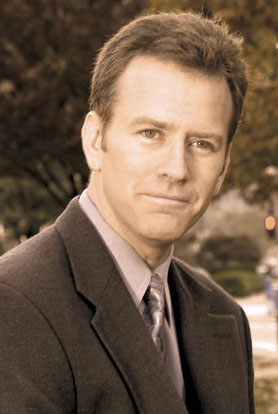
Dialogue: Steve Inskeep Talks Radio
Editor’s Note, April 13, 2012: Carmel, Indiana, turns 175 years old this year. Its native son Steve Inskeep, co-host of NPR’s “Morning Edition” returns tonight to speak at the Founders Dinner.
You’ve recently become a dad, and you’ve also been a war-zone reporter. How do the pressures stack up?
(Laughs) They’re very similar in that there’s a deadline, and you have to be ready. They’re a little different in that, with a child, you don’t know what the deadline is, and no matter how many preparations you make, you’re never ready.
You got your start as a high-school sportscaster in Carmel (WHJE). How did that shape your skills as a talk-radio host?
I learned a lot of my radio that way. When you’re live for huge chunks of time, it’s entirely up to you to paint that picture and carry that broadcast and convey the excitement of what is in front of you. If you screw up, you can screw up monstrously, and that was a great experience.
What was your biggest screw-up?
I was calling a basketball game when somebody either tripped over, or pulled out, the power cord for our equipment. I mistakenly thought that our backup equipment had also failed, so I let out a string of obscenities, many of which went over the air. Listeners, including my parents, got to hear my long disquisition.
You don’t have a special “radio voice.” Is that intentional?
Absolutely. That’s the great thing about NPR. You can talk like your real self—and you’re at your best when you do. Our guests are at their best when they’re just talking, too—just telling a story like they would sitting in their living room.
What do you listen to when you have control of the dial?
NPR news, or a tiny bit of all-news radio, but actually, I do that less and less. More often, I’ll listen to music radio, but not commercials. I’m perfectly willing to spend five minutes going all the way down the dial to avoid commercials.
I understand you’re a Springsteen fan. What’s the appeal?
With a couple words he creates a sense of place; with a couple hundred words he creates a mood or sometimes an entire story. That’s what we have to do as journalists.
You also dabble in fiction writing. Between journalism and fiction, which has produced the strangest stories?
In recent times it would have to be nonfiction just because of some of the strange places I’ve been. No place I’ve been is quite so unreal as Afghanistan. I was there at a particularly unreal time during the war and its initial aftermath. The landscape is unreal. The sunlight seems unreal. Everything seemed a little brighter, as if you had color-corrected your pictures. And the things that the people did and said were beyond almost anything I’ve read in a novel.
What do you miss most about Indiana?
Aside from family, I miss just being there. when you see those plowed fields and the tree lines, when every third song on the radio is Mellencamp, you know you’re home.
Photo by Debbie Accame
This article originally appeared in the April 2005 issue.





